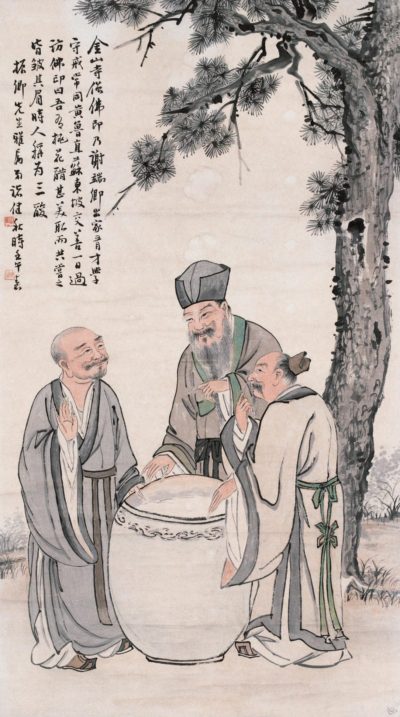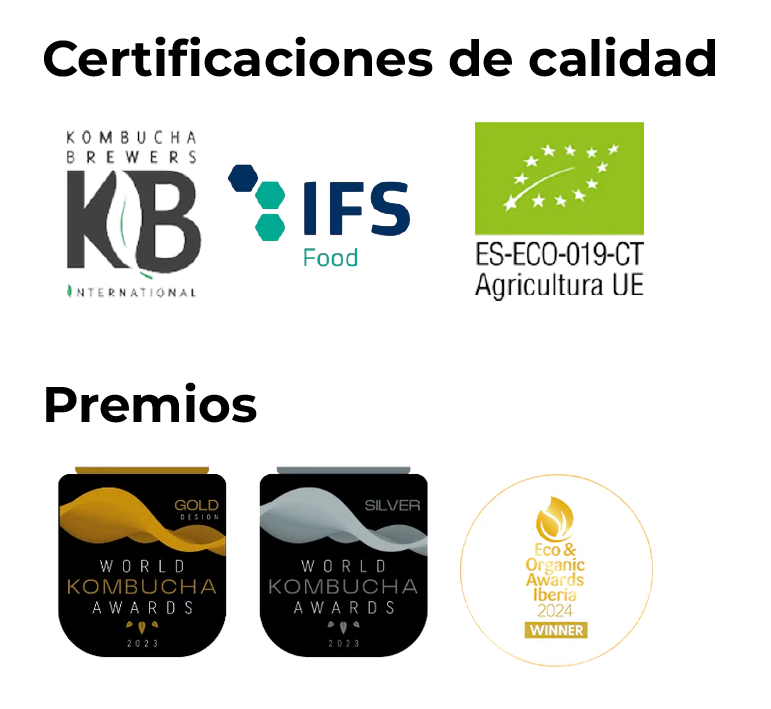History of kombucha
Mun Kombucha is now the lowest sugar kombucha on the market. The one recommended by the best health specialists and the one that thousands of clients consume faithfully. Big projects don't usually start in conventional spaces. Mun's started in the kitchen of Mercè and Jordi's loft. A journalist and an engineer passionate about healthy eating and lifestyle were pioneers in the development of this drink, when hardly anyone here knew about it. The year was 2013.
The madness of the pursuit of health
Little did Jordi Dalmau imagine that the solution to the problems caused by Gilbert's syndrome, which he was diagnosed with when he was only 13 years old, would come in a drink format.
An engineer by profession, Jordi struggled daily with headaches, muscle pain and fatigue caused by his difficulty eliminating toxins through the liver. The search to improve his health had been tireless. After various modifications to his diet, they advised him to introduce fermented foods.
He researched and researched more and, to the sauerkraut and kefir he already made, he decided to add kombucha. It was 2013 and no one knew where to find it in stores, so Jordi decided to start making it at home. It was clear. Some of the organic acids in this ancient drink could be the key to improving your liver detoxification. And, bingo! It began to consume her and it was as if she took off that heavy backpack that she had carried for so long.
Mercè Pérez, his partner, had discovered around that time that he methylated slowly, that his body also had problems getting rid of toxins. And her newborn son had a bunch of food allergies that required focusing on his digestive system and microbiota, as well as his immunity.
That's how it was almost like a puzzle, all the pieces fit together. The fermented tea that was already consumed by Chinese and Japanese emperors and even samurai, could be the cornerstone of the well-being of the entire family.
The first fermentations tasted a bit like lightning. Little by little, Jordi modulated the recipe. He offered it to friends who, with some reluctance, tried it. They couldn't say if they liked it or not. But, shortly after, they asked him if he could give them another bottle.
And one day, there were no more friends to give kombucha to. And Jordi and Mercè decided to embark on the adventure of a lifetime, leaving their professions behind, and launching in 2015 the first manufacturing and marketing plant for organic, glass-packaged kombucha in all of Spain. His secret had to be shared. Everyone should try kombucha and experience its benefits.
They set themselves the goal of making an ultra-healthy, absolutely natural drink, with certified organic ingredients and with as little sugar as possible without losing a bit of its incredible and addictive flavor.
They wanted to make the kombucha they would have liked to find in the store.
Everyone talks about her. The kombucha drink is the trendy drink. Although not as many really know what kombucha is. Here we will discuss the origin of kombucha, since the history of kombucha dates back to more than 2,000 years ago in Asia.
The origin of kombucha
Although the date of the origin of kombucha is uncertain because no document is preserved with K-day, the day the drink officially emerged, the first time this drink was made known was in China two millennia ago, during the Qin dynasty (221 BC). It is said that Emperor Qin Shi Huangdi was the first to make and drink kombucha. About 200 years later, the drink would gain worldwide fame after a Tibetan monk named Kombu - who ended up giving its name to the drink - gave it to the Japanese emperor Inkyo who, as a result of drinking it, was cured of digestive discomfort. Thanks to the fame granted by this fact, the drink spread throughout the Asian continent. In fact, it is said that even Japanese warriors, the famous samurai, brought kombucha to their battles to have more energy.

Reasons for the success of kombucha
From Asia, kombucha traveled through the Silk Road in Russia and subsequently throughout Europe. It was a very popular drink that was made and consumed at home until, during World War II, there was a shortage of sugar and tea, which were rationed, and its consumption was considerably reduced. In the 1960s, Swiss scientists analyzed the drink and confirmed the benefits of its consumption, giving it a new boost among consumers.
Kombucha has survived over time thanks to the fact that its defenders have been able to verify, firsthand, all the benefits it brings them, such as the contribution of probiotics that improve digestion or the detoxifying effects they experience after drinking it.
It has been on the market for almost two decades in the United States.
History of kombucha in Spain
Kombucha originated in China and later spread to Japan and India. In Europe, it arrived at the beginning of the 20th century through Russia and spread to several countries, including Spain in 1951 thanks to the Peruvian doctor Faustino Oliver Rodríguez .
In Spain, kombucha became popular thanks to the "mushroom" or sourdough, which families shared with friends and neighbors. The transaction was free, which led to the mushroom being known as the charity mushroom or the mushroom of long life.
This cartoon in Catalan from around 1955 already talks about the existence of kombucha in Spain. Its text says like this:

A fungus of strange shape
is causing a sensation throughout Spain.
As people say
it would have come from the East.
And here begins the story
of this fungus full of glory.
The juice of this mine-fungus
is named theomicin.
It cures everything: chicken eyes,
sour heart, flu, neck,
all kinds of itching
and even back pain.
And it ended like this:
A distinguished psychiatrist
"poor lunatics" he said
that the fungus of such fame
is pure nonsense,
and that he, for many reasons,
prefers the mushrooms.
And besides, if this lasts
and nobody pays attention,
many people - it says clearly and openly -
will be touched by the fungus.
Today, kombucha is sold as a refreshing and functional drink with probiotic and antioxidant properties. The first commercial producer of kombucha was GT Dave, who in 1995 began selling it through his company Synergydrinks in Beverly Hills, California.
In Spain, kombucha has experienced a significant boom since Mūn Ferments began making and marketing it in 2015 .
The determination to solve the health problems of the company's founder, diagnosed with Gilbert's Syndrome during his childhood, led him to investigate and find kombucha as a solution to the discomfort caused by this ailment.
Jordi Dalmau chose to put aside his profession as an engineer to start the production and marketing of the first unpasteurized kombucha in Spain that is completely stable at room temperature . The production process carried out by Mūn Ferments achieves a drink with practically no residual sugar, which means that it does not need refrigeration to control possible refermentation.
Mūn Ferments kombuchas also only contain top quality ingredients, absolutely natural and certified organic. In this way, the company manages to make available to consumers the best kombucha on the Spanish market: delicious and healthy.





